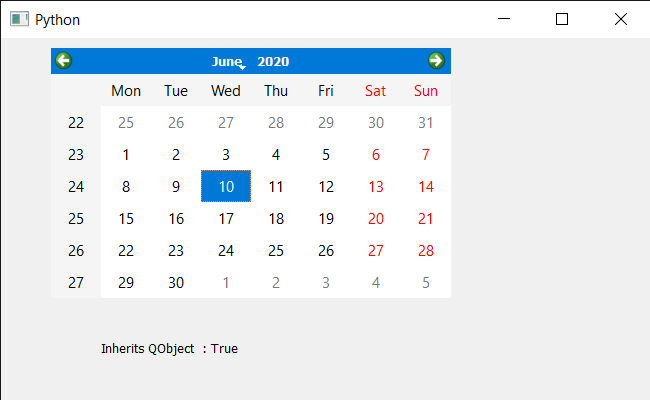En este artículo veremos cómo podemos comprobar si QCalendarWidget hereda otra clase o no. Para hacerlo usamos la propiedadHereda, esta propiedad devuelve verdadero si el objeto de calendario es una instancia de una clase que hereda className o una subclase QObject que hereda className; de lo contrario, devuelve falso.
Nota: Se considera que una clase se hereda a sí misma.
Para hacer esto, usaremos el método de herencia con el objeto QCalendarWidget.
Sintaxis: calendar.inherits(“QObject”)
Argumento: toma una string como argumento, es decir, el nombre de la clase
Retorno: devuelve bool
A continuación se muestra la implementación.
Python3
# importing libraries
from PyQt5.QtWidgets import *
from PyQt5 import QtCore, QtGui
from PyQt5.QtGui import *
from PyQt5.QtCore import *
import sys
class Window(QMainWindow):
def __init__(self):
super().__init__()
# setting title
self.setWindowTitle("Python ")
# setting geometry
self.setGeometry(100, 100, 650, 400)
# calling method
self.UiComponents()
# showing all the widgets
self.show()
# method for components
def UiComponents(self):
# creating a QCalendarWidget object
self.calendar = QCalendarWidget(self)
# setting geometry to the calendar
self.calendar.setGeometry(50, 10, 400, 250)
# setting cursor
self.calendar.setCursor(Qt.PointingHandCursor)
# creating label to show the properties
self.label = QLabel(self)
# setting geometry to the label
self.label.setGeometry(100, 280, 250, 60)
# making label multi line
self.label.setWordWrap(True)
# checking if calendar inherits QObject
value = self.calendar.inherits("QObject")
# setting text to the label
self.label.setText("Inherits QObject : " + str(value))
# create pyqt5 app
App = QApplication(sys.argv)
# create the instance of our Window
window = Window()
# start the app
sys.exit(App.exec())
Producción :

Publicación traducida automáticamente
Artículo escrito por rakshitarora y traducido por Barcelona Geeks. The original can be accessed here. Licence: CCBY-SA